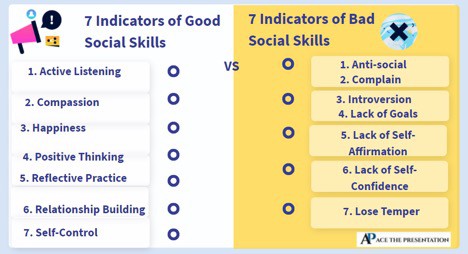7 Indicators of Good and Bad Social Skills
Every one of us knows that friend or colleague who easily makes friends or convinces people, or even helps others because they empathize with their situation. Sometimes it feels like they have some super magic power to easily deal with others. Guess what? We call that Social Skills.
Social Skills are the aptness we can have by communicating and socializing with others, putting ourselves in someone else’s shoes, and dealing with difficult social situations.
These skills are emerging and influenced by the social environment we have grown in; They are transformed over time and acquired according to our relationships, interactions with the World.
Good and bad social skills can be discerned by how we engage in a conversation or environment, how we manage stress, and communicate about our feelings and needs.
Related Topics:
Top 7 Benefits of having Strong Social Skills as an Adult
Interpersonal vs. Intrapersonal Skills
Top 15 Interpersonal Skills at Work
The 7 INDICATORS OF GOOD AND BAD SOCIAL SKILLS

7 Indicators of Good Social Skills
- Active Listening
There is no need to rush things up, each person we interact with are different, but every person wants to be heard when talking. Being an active listener means that we pay attention in-depth to the person who is speaking.
- Compassion
Compassion is the feeling that can be described as an understanding or care of another person’s emotional state. It often combines with a desire to relieve or lessen the suffering of another being and show extraordinary kindness to those who suffer.
Example: Taking care of a street animal we just crossed whom as paw injuries;
- Happiness
Happiness is the little things we do for ourselves that may or not also benefit other people. When we are happy, we feel a state of satisfaction, conscience, satisfaction, contentment, and well-being.
Example: Doing volunteer work at an orphanage can make someone happy and beneficial for children who need help and care. May bring happiness to them too because they will receive a little bit of love.
- Positive Thinking
Positive thinking is a perspective of adjusting our mindset to see situations often problematics as opportunities to grown and new ways to do, resolve, and learn from them. Tony Robbins understands Positive Thinking as an emotional and mental attitude that focuses on the good and expects results that will benefit us.
For him, it is about anticipating happiness, health, and success – essentially, training yourself to adopt an abundance mindset and cultivate gratitude for our accomplishments and those of others.
Example: Sometimes we can go to University to finish our job and because we don’t find work in our formation area we apply for a waiter for example and be faithful while searching for the position of our dreams.
- Reflective Practice
Reflective practice comes from feeling open enough to share and learn from social experiences and others. This means we can take lessons from the success or fail of an action we took or someone we know.
People who use reflective practice as a way of personal development can acquire benefits by increasing self-awareness, which is a crucial component of emotional intelligence and develops a better understanding of others.
- Relationship Building
Relationship Building is the social tools we use to interact and communicate with other people about how we feel and stand our beliefs and needs.
Ones more than others can build a social relationship faster than others. Practice is the key if we don’t talk with people, and by that, I mean all types of them.
Randomly, know we need to talk with that to develop social communication skills.
- Self-Control
Self-Control is the power we have to decide if we will guide by externs acts or not. Unlike emotional intelligence, which is the ability to determine if we will engage in internal feelings.
Self-control is the management control of our behavior to avoid temptations and to achieve goals.
After looking at the 7 indicators of GOOD social skills, the next point of discussion will be the indicators of BAD social skills. Before digging into that, let me add below some of the top related and interesting articles that can add to what you’re learning from this one. If any of the titles picks your interest, please click and open in a new tab, so you can check them out later. Enjoy!
-
8 THINGS YOU CAN DO TO ACE ANY JOB INTERVIEW

The happiness when receiving a call marking the job interview gives rise to endless anxiety. After all, it’s only a few minutes to prove your worth, impress the recruiter and seize the opportunity. However, to do well at the job interview, you need to think about what you will say, how you will present yourself,…
-
An Easy Guide to All 15 Types of Speech

We keep learning that there are three types of speeches, informative speeches, persuasive speeches and special occasion speeches. However, I believe and know that there are many more such as debates, motivational speeches, forensic speeches, impromptu speeches, eulogy, and so on. Here’s a growing list of over 13 types of speech and tips on how…
7 Indicators of Bad Social Skills
- Anti-Social
An Anti-Social person is the one who is contrary to the ideas, customs, or interests of society; the term anti-social is also applied in common sense to people with an aversion to social interaction.
Here, the person who is considered anti-social behavior because usually have arguments opposite and not morally and ethically accepted by society, causes, or is likely to cause harassment, alarm, or distress to people.
Example: Using headphones in an environment like a classroom or meeting knowing that it is forbidden just to be alone.
- Complain
A complainer is never satisfied or happy with anything; this attitude can annoy other people because of our lack of positive thinking and gratitude. Someone that complains a lot usually doesn’t have many friends because of the lousy vibe exhalation.
- Introversion
According to psychiatrist and owner of the concept Carl Jung, Introversion is the state of being predominantly interested in one’s mental self. Introverts are typically perceived as more reserved or reflective. Some famous psychologists have characterized introverts as people whose energy tends to expand through reflection and decrease during an interaction.
- Lack of Goals
We would like to attain personal goals and aspirations in life, have a family or not, have our apartment. So having no plans and aspirations, whether short-term or long-term, can pass the impression that we are lost in life and lazy.
People tend to socialize more with us if we have some activity going on to achieve a goal or aspiration; exciting people are decision-makers and do not let be lead the others.
- Lack of Self-Affirmation
We may have a lack of Self-Affirmation when we don’t know ourselves or have low self-esteem, so we accept anything people advise us as useful to us because they must understand better.
Lack of Self-Affirmation is a flawed social skill because it may lead to ways of living or situations that are bad to us and socially unacceptable.
- Lack of Self-Confidence
Lack of Self-Confidence comes from low esteem, which is the feeling and opinion we have about ourselves. Because we may have had one or more bad experiences about our body, academic performance, that opinion can be formed and affect our day-to-day life.
Example: Feeling anxious while delivering a presentation, we own the content. The last time we were not prepared enough, and the audience noticed, now we are focused on notes.
- Loss of Temper
Losing temper is a clear sign of emotion overload, rooted in stress, family problems, financial issues, anger, or lack of emotional intelligence. When we lose our temper with people, it can push people away and avoid talking with us.
Example: We ask a colleague to make some copies, and we lose our patience because we are stressed about family problems or because we woke up like that and didn’t know how to manage our emotions.
We end up shouting with her when she arrives, making her and other colleagues avoid interaction with us.
Conclusion
Social Skills are the ability to communicate and socialize with other people through speeches, active listening, writing, and non-verbal language; Social skills allow us to comprehend and be understood by various groups.
Acquiring good or bad social skills depends mostly on how we were created and raised. The culture here exposes and has a significant role, and however, it is possible to develop social skills.
Reference and Further Reading
Chopra, Deepak. The 10 Commandments of True Happiness.
SetItUp2Thrive.Org.Social Skills Thriving Indicators








